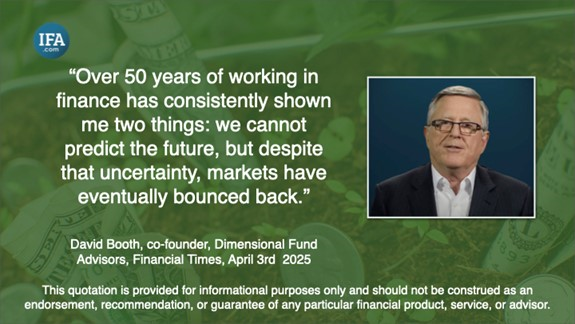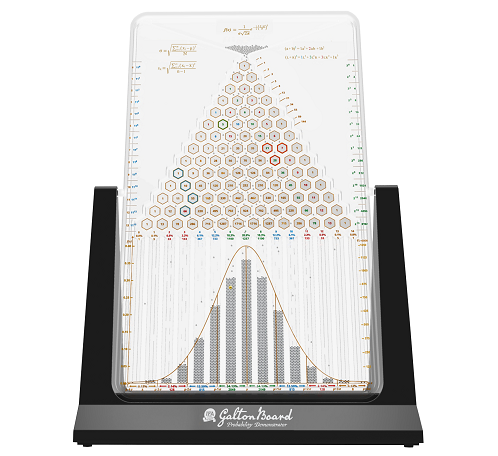Most of the time, investors give little thought to the financial markets or the size of their portfolios. But every now and again there comes a point when it's hard not to think about them, and we're experiencing one of those episodes now.
Markets fell sharply on Thursday, April 3rd after President Trump's announcement of new tariffs — not just in the U.S., but around the world. Heading into Friday, April 4th the Markets continue to react to Trumps tariffs and the Vix volatility index has risen to its highest level in seven months.
Why Did Markets React So Badly?
Why, then, did markets react negatively to President Trump's announcement?
Well, as regular readers of our articles already know, stock markets are highly efficient at incorporating information. It's only new information, in other words, that causes prices to move. The bigger the surprise, the bigger the move.
As Larry Swedroe explains in his latest blog post: "The market is The Wisdom of Crowds, taking the average estimate of what is expected will happen."
We've known for some time that the Trump administration wanted to introduce higher tariffs. In this case, there was great uncertainty as to what the details would be.
"What we got," writes Larry, "was the left tail of the potential distribution, not the median, so markets reacted violently to the negative."
What Should Investors Do?
At times like these, human beings are hard-wired to react — to do something, if only to relieve their emotional discomfort. But, almost invariably, the wisest course of action is inaction.
There are a number of reasons why this is. The first and most obvious one is that reducing your equity exposure after markets have fallen is like closing the stable door after the horse has bolted. You're effectively turning paper losses into actual losses.
A second reason is that markets can and do recover remarkably quickly. Yes, bear markets can last for a long time, but market volatility is often over within a few weeks or even days. Who knows? A few months from now, you may have forgotten all about the so-called Tariff Tantrum altogether.
A third reason is that the days when markets fall the most are often followed, straight afterwards, by the days when they rise the most. Things can look very different within just 24 hours, and being invested on the best days makes a huge difference to your eventual returns.
A fourth reason why it's generally best to do nothing is that equity markets sometimes over-react to bad news. Very often, it's the uncertainty the news creates rather than the news itself that causes markets to fall. Yes, markets may well fall further from here. It's quite possible, however, that as the impact of Trump's tariff package becomes clearer, they will start to recover.
Tune Out the Noise
Financial market history shows us again and again that the investors who do best are those who are able to tune out the noise when markets fall. Markets weathered some almighty storms over the course of the 20th century, including the Great Depression, two world wars, the inflation crisis of the 1970s, and Black Monday in 1987. Markets recovered again after the global financial crisis of 2008-09.
"Each crisis can feel like the end of the world when it happens," wrote Dimensional co-founder David Booth in the Financial Times yesterday. "Yet the pattern of recovery stays remarkably consistent. Over 50 years of working in finance has consistently shown me two things: we cannot predict the future, but despite that uncertainty, markets have eventually bounced back."
In fact, markets can bounce back with extraordinary speed. Think, for example, of what happened in 2020. As the Covid-19 pandemic spread, the U.S. stock market fell 34 per cent in just 23 days. Yet within a year, the market had not only recovered, but also risen 78% from its lowest point.

Is This Time Any Different?
The question then that investors need to ask is this: Do I really think that this time is any different?
Is this the start of a much bigger downturn? Could we be entering an ice age for stocks lasting another 10 or 20 years or more? The answer, of course, is that nobody knows for certain. The current volatility may well continue for some time yet. But history suggests that this crisis too will pass. Disciplined, diversified investing is a strategy that has historically aligned with long-term financial goals.
A Three-point Plan
For David Booth, the best thing investors can do is develop a disciplined approach.
He writes: "I have found that it helps to first, accept uncertainty as the cost of opportunity — higher expected returns are your ‘reward' for taking on greater risk. Second, it is important to match your investments with your life, not the news cycle. Third, find partnerships, not predictions. Working with a trusted financial adviser can help you create a personal plan that fits your goals and aligns with your values."
David Booth's philosophy is very closely aligned with our own at IFA. We share his passion for investor education. We agree with him that understanding how markets work leads to better decisions.
We also believe in giving all of our clients a robust financial plan and helping them stick to that plan through thick and thin. Every client's plan already factors in the risks of events like the current tariff crisis.
Time to Get Disciplined
If the current market turmoil has left you feeling anxious and confused about what to do, why not see it as a wake-up call?
Don't keep checking your portfolio or listening to the advice of stock market pundits. And certainly, don't act on market forecasts, which is effectively just gambling.
Instead, learn how markets work: this first-class documentary, which features IFA founder Mark Hebner, is an excellent way to start, and it's free to view on YouTube in the U.S.
Then find yourself an evidence-based financial advisor, who can work out your risk capacity score, and design you an evidence-based investment portfolio to match it.
It's time to stop relying on forecasts and guesswork and leaving your financial future to chance. It's time to get disciplined — to stop speculating and start investing.
ROBIN POWELL is the Creative Director at Index Fund Advisors (IFA). He is also a financial journalist and the Editor of The Evidence-Based Investor. This article reflects IFA's investment philosophy and is intended for informational purposes only.
This article is intended to provide general educational insights into market behavior and investment strategies during periods of volatility. It does not constitute financial or investment advice and should not be relied upon in making financial decisions. Readers are encouraged to consult with a qualified Investment Advisor to create a personalized investment plan based on their individual financial needs and circumstances.
This article is intended for informational purposes only and reflects the perspective of Index Fund Advisors (IFA), with which the author is affiliated. It should not be interpreted as an offer, solicitation, recommendation, or endorsement of any specific security, product, or service. Readers are encouraged to consult with a qualified Investment Advisor for personalized guidance. Please note that there are no guarantees that any investment strategies will be successful, and all investing involves risks, including the potential loss of principal. Quotes and images included are for illustrative purposes only and should not be considered as endorsements, recommendations, or guarantees of any particular financial product, service, or advisor. IFA does not endorse or guarantee the accuracy of third-party content. For additional information about Index Fund Advisors, Inc., please review our brochure at https://www.adviserinfo.sec.gov/ or visit our website at www.ifa.com.













